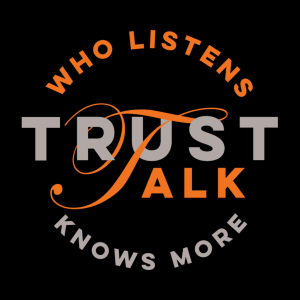
TrustTalk - It's all about Trust
Arts & Culture Podcasts
Trust is the invisible force that shapes our world - from the personal to the geopolitical. At TrustTalk, we’re committed to exploring trust in all its complexity. Since 2020, we've been engaging with thought leaders from around the globe to unpack how trust influences relationships, business, technology, society, and global affairs.
Every episode offers insightful conversations that reveal why trust matters - and what happens when it breaks down. If you’re curious about the forces that hold people, institutions, and nations together, this is a journey you won’t want to miss.
Location:
United States
Genres:
Arts & Culture Podcasts
Description:
Trust is the invisible force that shapes our world - from the personal to the geopolitical. At TrustTalk, we’re committed to exploring trust in all its complexity. Since 2020, we've been engaging with thought leaders from around the globe to unpack how trust influences relationships, business, technology, society, and global affairs. Every episode offers insightful conversations that reveal why trust matters - and what happens when it breaks down. If you’re curious about the forces that hold people, institutions, and nations together, this is a journey you won’t want to miss.
Language:
English
Website:
https://pod.co/trusttalk
On Courts, Politics and Trust
Duration:00:29:05
Impatience, Vague Requests, and the Strain on Trust
Duration:00:31:23
Scandal, Suspicion, and the Road to Rebuilding Trust
Duration:00:20:37
Organizational Schizophrenia, AI Villains, and the Logic of Suspicion
Duration:00:19:18
Trade and Trust in Turbulent Times
Duration:00:20:57
Trust Through Open-Source Evidence
Duration:00:26:48
Woke Words, Broken Trust
Duration:00:23:48
Desire, Trust and the Boardroom
Duration:00:22:49
China–US, Trust in an Age of Trade Tensions and Civilizational Politics
Duration:00:28:17
The Bankers' New Clothes, The Danger of Blind Trust in Finance
Duration:00:29:29
Leading Through the Storm: Fairness, Trust, and Tough Decisions
Duration:00:21:28
Immigration, Trust, and the Politics of Fear
Duration:00:34:25
Trust, Performance, and the Dark Side of Business Partnerships
Duration:00:27:35
Trust, Doubt and the Power of Experts
Duration:00:23:44
From Tap to Trust: Water as a Measure of Governance
Duration:00:23:51
Does Control Erode Trust?
Duration:00:16:32
Force for Good, Leadership with Purpose and Trust
Duration:00:21:19
War, Alliances, and Trust: Navigating an Unstable Era
Duration:00:30:23
Religion and Trust
Duration:00:26:11
The Subtle Art of Trust: Curiosity and Connection
Duration:00:23:49